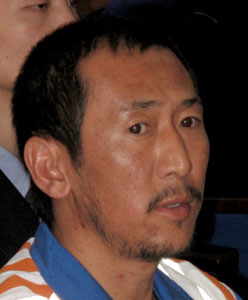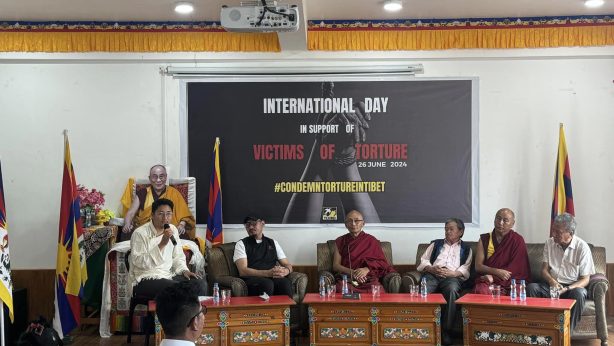Tibetan man sentenced to death over wife’s self-immolation

In a deepening crackdown on self-immolation protests, Chinese authorities in Ngaba (Ch: Aba) Tibetan and Qiang Autonomous Prefecture, Sichuan Province, have given death sentence to a Tibetan man for allegedly killing his wife.
Dolma Kyab, 32, was handed death penalty more than five months after the death of his wife, Kunchok Wangmo, 29, in Dzoege (Ch: Rue’rgai) County in Ngaba Prefecture, according to a Xinhua report carried on the official Chinese website of china.org.cn and Global Times.
The report said Dolma Kyab strangled his wife to death at 11 pm on 11 March 2013 following an argument over his drinking problem. He then burned his wife’s body early next morning to make it look like she committed self-immolation, the report claimed quoting court authorities. Mr. Kyab is the sole bread earner in his family which consists of his eight-year-old daughter and his aged mother .
However, exile Tibetan sources had reported that Kunchok Wangmo died of self-immolation protest on 13 March 2013 on the main street of Dzoege County town. A day later, on 14 March, Dolma Kyab was detained after he refused to follow official orders to blame the death of his wife on domestic problems.
Interestingly, the Xinhua report quoted Mr Kyab’s lawyer Su Haijun as saying that Kunchok Wangmo’s parents would not believe that their son-in-law killed their daughter as the husband and wife “were generally on good terms with each other.”
In recent years, China has made aggressive overtures, mainly in the form of hush money, to silence family members of self-immolation protesters. Last year, Dhonue, husband of Dolkar Tso, was secretly detained after he refused to accept bribe from the authorities in exchange for blaming the death of his wife on family problems. Dolkar Tso died of self-immolation protest on 7 August 2012 near Tsoe Gaden Choeling Monastery in Tsoe city in Kanlho (Ch: Gannan) Tibetan Autonomous Prefecture, Gansu Province. Another self immolation protester Sangay Gyatso’s family members from the same region were offered a bribe of one million yuan to sign a document stating that his self-immolation was not targeted against China’s rule over Tibet, according to Phayul.com.
Mr Kyab has become the first Tibetan sentenced to death in connection with self-immolation protests. The Intermediate People’s Court in Ngaba Tibetan Autonomous Prefecture passed the death sentence.
In January 2013, the same court sentenced Lobsang Kunchok, 40, to death with two years’ reprieve while his nephew, Lobsang Tsering, 31, was sentenced to 10 years in prison on “intentional homicide” charges.
The latest death penalty indicates that the authorities have hardened their stance on the issue of self-immolation, by making an example out of a few defiant relatives to scare and intimidate other family members and relatives of self-immolation protesters into toeing the official line. This year saw an alarming rise in the number of Tibetans arrested and sentenced in connection with self-immolation protests, with some getting as many as six to 10 years in prison for alleged connections with self-immolation protests. In February 2013, Chinese authorities in Qinghai Province reported the detention of more than 70 Tibetan suspects out of which 12 were officially charged.
TCHRD remains reasonably skeptical over alleged confessions made by Mr Dolma Kyab regarding his involvement in the so-called murder of his wife. Torture is still used extensively to extract confessions in politically-motivated cases. China’s lack of transparency in handing death penalty, in addition to its frequent failure to comply with international legal standards raises important questions over the lawfulness of the latest death sentence passed on Dolma Kyab. Even though China has claimed that Mr. Kyab was convicted at an “open trial”, the so-called trial is a suspect since there is almost 99% conviction rate in criminal cases in China.
The Centre calls on the Chinese authorities to refrain from politicising the issue of self-immolation protests and end the reprehensible practice of smear campaign against legitimate expressions of grievances.
Most importantly, the Centre strongly condemns the use of death penalty as it violates the fundamental right to life and the right not to be subjected to cruel, inhuman or degrading treatment or punishment. The persistent use of death penalty demonstrates China’s rejection of the United Nations Global Moratorium on the Death Penalty, adopted in 2007, which establishes a suspension on executions with the view to abolish the death penalty.
The Centre seeks immediate and urgent intervention by the UN Special Rapporteur on Extra Judicial, Summary or Arbitrary Execution, governments and the international community in ensuring that Mr Dolma Kyab’s human rights are respected and protected. The Centre calls on the Special Rapporteur to investigate and transmit an urgent appeal to China regarding the death penalty in this case.


